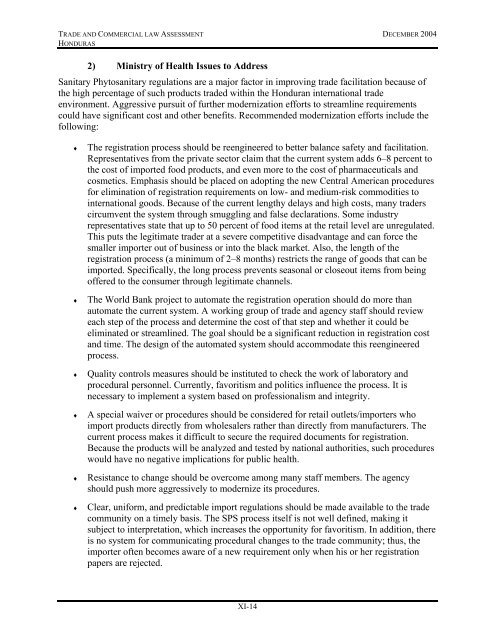Trade and Commercial Law Assessment - Honduras - Economic ...
Trade and Commercial Law Assessment - Honduras - Economic ...
Trade and Commercial Law Assessment - Honduras - Economic ...
You also want an ePaper? Increase the reach of your titles
YUMPU automatically turns print PDFs into web optimized ePapers that Google loves.
TRADE AND COMMERCIAL LAW ASSESSMENT DECEMBER 2004<br />
HONDURAS<br />
2) Ministry of Health Issues to Address<br />
Sanitary Phytosanitary regulations are a major factor in improving trade facilitation because of<br />
the high percentage of such products traded within the Honduran international<br />
trade<br />
env ironment. Aggressive pursuit of further modernization efforts to streamline requirements<br />
could have significant cost <strong>and</strong> other benefits. Recommended modernization efforts include the<br />
following:<br />
♦ The registration process should be reengineered to better balance safety <strong>and</strong> facilitation.<br />
Representatives from the private sector claim that the current system adds 6–8 percent to<br />
the cost of imported food products, <strong>and</strong> even more to the cost of pharmaceuticals <strong>and</strong><br />
cosmetics. Emphasis should be placed on adopting<br />
the new Central American procedures<br />
for elimination of registration requirements on low- <strong>and</strong> medium-risk commodities to<br />
international goods. Because of the current lengthy delays <strong>and</strong> high costs, many traders<br />
circumvent the system through smuggling <strong>and</strong> false declarations. Some industry<br />
representatives state that up to 50 percent of food items at the retail level are unregulated.<br />
This puts the legitimate trader at a severe competitive disadvantage <strong>and</strong> can force the<br />
smaller<br />
importer out of business or into the black market. Also, the length of the<br />
registration process (a minimum of 2–8 months) restricts the range of goods that can be<br />
imported. Specifically, the long process prevents seasonal or closeout items from being<br />
offered to the consumer through legitimate channels.<br />
♦<br />
♦<br />
The World Bank project to automate the registration operation should do more than<br />
automate the current system. A working group of trade <strong>and</strong> agency staff should review<br />
each step of the process <strong>and</strong> determine the cost of that step <strong>and</strong> whether it could be<br />
eliminated or streamlined. The goal should be a significant reduction in registration cost<br />
<strong>and</strong> time. The design of the automated system should accommodate this reengineered<br />
process.<br />
Quality controls measures should be instituted to check the work of laboratory <strong>and</strong><br />
procedural personnel. Currently, favoritism <strong>and</strong> politics influence the process. It is<br />
necessary to implement a system based on professionalism<br />
<strong>and</strong> integrity.<br />
♦ A special waiver or procedures should be considered for retail outlets/importers who<br />
import products directly from wholesalers rather than directly from manufacturers. The<br />
current process makes it difficult to secure the required documents for registration.<br />
Because the products will be analyzed <strong>and</strong> tested by national authorities, such procedures<br />
would have no negative implications for public health.<br />
♦ Resistance to change should be overcome among many staff members. The agency<br />
should push more aggressively to modernize its procedures.<br />
♦ Clear, uniform, <strong>and</strong> predictable import regulations should be made available to the trade<br />
community on a timely basis. The SPS process itself is not well defined, making<br />
it<br />
subject to interpretation, which increases the opportunity for favoritism. In addition, there<br />
is no system for communicating procedural changes to the trade community; thus, the<br />
importer often becomes aware of a new requirement only when his or her registration<br />
papers are rejected.<br />
XI-14

















